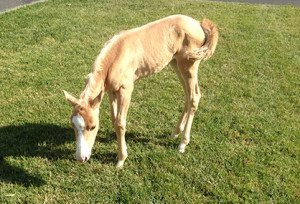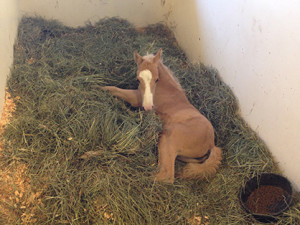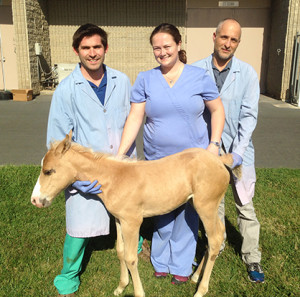Newborn Foal Treated For Botulism, Endures Month-Long Hospitalization

“She could not lift her head to reach the udder on her own, as it dropped instantly if support was removed.” Photo courtesy of UC Davis.
UC Davis
Bossy’s Cookies, a newborn pony/Paint cross filly, was brought to the UC Davis Veterinary Medical Teaching Hospital at 10 days old for a progressive neurological disorder. Following three days of normal activity since birth, she was down for prolonged periods in her stall, staggering around, and unable to rise on her own. Her owners initially suspected a neck injury, as she was not able to raise her head or neck, and she seemed to have abnormal range of motion through her cervical spine.
If assisted, she could stand and was able to nurse if her head was supported in the proper position, but she could not lift her head to reach the udder on her own, as it dropped instantly if support was removed. Initially, when she went down, her attitude seemed positive and responsive, but Bossy’s Cookies became quieter and weaker as days progressed. She was not standing as long or walking as well, and she spent most of her time in lateral recumbency.
Bossy’s Cookies was examined by her veterinarian near her home in the Inland Empire region of Southern California. Radiographs showed no damage to her spine or fractures of any kind. Euthanasia was considered, but her owners weren’t quite ready to give up. They heard about the equine experts at UC Davis, so they loaded up Bossy’s Cookies and her mare and drove the nearly 400 miles to Davis for one last effort to save her life. In route, they stopped every two hours to let the filly nurse from her dam.
Once at UC Davis, Bossy’s Cookies was examined by the Large Animal Clinic’s Equine Surgical Emergency and Critical Care Service as well as the Equine Medicine Service. Dr. Gary Magdesian, an expert in neonatology and critical care thought that she had signs of a neuromuscular disease, especially botulism. He conferred with Bossy’s Cookies veterinarian back home and decided it was worth a chance of testing for botulism, which is potentially treatable. Because time is of the essence with botulism, treatment for it began immediately.
Botulism can be a fatal illness caused by a toxin produced by bacteria. In horses, botulism can occur three different ways:
1) toxico-infectious botulism, where young foals eat spores from the environment which proliferate inside their gut, allowing the organism to produce toxins
2) by eating toxin that’s already been made in spoiled feed or water, generally caused by anaerobic conditions in the feed or the presence of dead animals in the feed
3) wound botulism, where a bacterial organism proliferates in a necrotic wound
Electrophysiology testing conducted by VMTH research associate Dr. Colette Williams and clinician Dr. Monica Aleman was compatible with botulism, and PCR testing confirmed that Bossy’s Cookies was positive for Type A botulism, which relaxes the entire muscular system by inhibiting nerve transmission to the muscles. Type A botulism tends to be the most severe form. When treated properly, Type A botulism patients can make a full recovery, but that can take several weeks. Dr. Magdesian, along with resident Dr. Jamie Prutton, fourth-year student Anatasha Plummer, and the VMTH patient care team, began treating Bossy’s Cookies with botulism antitoxin and IV penicillin.
When Bossy’s Cookies first arrived at UC Davis, she was too weak to eat. Tube fed at first, she was able to eat on her own shortly after beginning the botulism antitoxin treatments. She started to make other improvements also – gradually at first, but then more significant strides to indicate a recovery. Within a week, she made efforts to stand on her own. By two weeks, those efforts became stronger, as she was nearly able to stand. At three weeks, she was able to stand with minor assistance and eager to be up and walking around her stall. By four weeks, Bossy’s Cookies stood on her own and was bright and active. Now at home, she continues to get stronger daily.
When newborn animals are hospitalized, they need around-the-clock care, especially recumbent foals. With its 24-7 emergency care staff, the VMTH was the ideal place for Bossy’s Cookies to receive care. Because of its ample amount of equine specialists, large patient care staff, and hundreds of veterinary students, UC Davis provided a compassionate environment in which to recover with the proper amount of care needed. Dr. Magdesian expects Bossy’s Cookies to make a full recovery.












